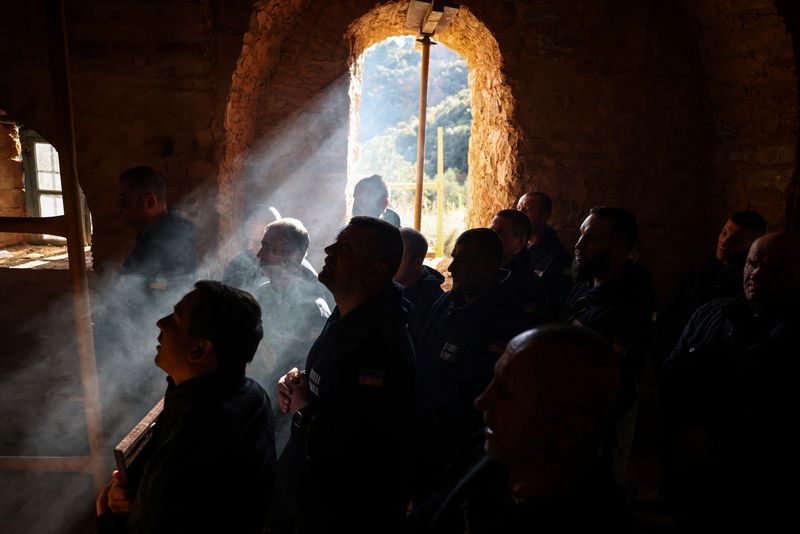By Alexandros Avramidis
MOUNT ATHOS, Greece (Reuters) – Ukrainian soldiers arrived in Greece with marks of war: one with a scar on his head, another with both legs amputated above the knee, some with invisible mental wounds from a three-year conflict that He has devastated his homeland. .
The men, 22 in all, had taken a bus more than 1,000 kilometers (620 miles) from the Ukrainian city of Lviv to a monastery built on a cliff on the mountainous Athos peninsula in northern Greece, where they hoped to escape the Haunting memories of the battlefield.
During their four-day stay, as part of a psychological support program organized by the Ukrainian authorities, the soldiers made a pilgrimage to a dozen monasteries on the slopes of Mount Athos, a spiritual center since the 10th century.
“Many soldiers are suffering from the events that took place in the last three years. Many of them are suffering from different illnesses – they are wounded and we have to rehabilitate them,” said Father Mykhailo Pasirskyi, a Ukrainian Orthodox priest who accompanied the men on their trip.
Russia’s full-scale invasion of Ukraine in February 2022 began the deadliest war on European soil in more than 70 years. As of August 2024, the UN Human Rights Monitoring Mission in Ukraine had documented nearly 12,000 civilian deaths and more than 24,000 injuries in Ukraine. Russia denies attacking civilians.
Ukrainian President Volodymyr Zelenskiy said in December 2024 that 43,000 Ukrainian servicemen had been killed and 370,000 wounded. He added that Russia had lost almost 200,000 soldiers. Moscow has not disclosed its losses but has said such estimates are greatly exaggerated.
Ivan Kovalyk was taking a break from the front in September 2023 when soldiers relieving him asked him to bring a radio, food and water. While he was going to get his belongings, a shell exploded nearby. Kovalyk, 22, lost both legs below the knee and now walks with prosthetics.
His fellow soldiers carried him across the uneven cobblestones and up the narrow stairs of the monasteries of Athos. But overall he walked unassisted and remains positive about his condition.
“Of course, it helped me a lot, because it helped me relieve stress,” he said of the visit to Athos, which he plans to repeat.
“There was always support from family, friends, comrades in arms, support from the State, without that it would not have been possible.”
Athos has been the spiritual home of the Orthodox Church since Byzantine times. The area was included in the UNESCO World Heritage list in 1988. Some ancient customs remain: to this day, only men are allowed to visit.
The Russian Orthodox Church has long ties to Athos and in 2016 President Vladimir Putin visited to mark 1,000 years since Russian monks first settled there. But NATO member Greece has backed Ukraine in the war, souring relations with Moscow. Ukrainian soldiers only visited Greek Orthodox sites.
To reach the imposing cliff-top monasteries, soldiers traveled the winding roads of the peninsula, up and around the forested mountains that flow into the Aegean Sea.
They communed shoulder to shoulder in small chapels with thick stone walls, whose narrow windows allowed enough light to penetrate the thick incense. They made lists on rectangular sheets of paper of loved ones they wanted to pray for. Between services they talked, smoked and took photos from balconies overlooking the sea.
“We already see that these five days spent on Athos will replace at least a year of rehabilitation in Ukraine, in hospitals or other medical centers,” said Orest Kavetskyi, a Lviv regional official who helped organize the trip.
“When I visited Athos, I felt the grace of God, the blessing of God, the greatness of Athos.”
(Writing by Edward McAllister; Editing by Alexandra Hudson)


